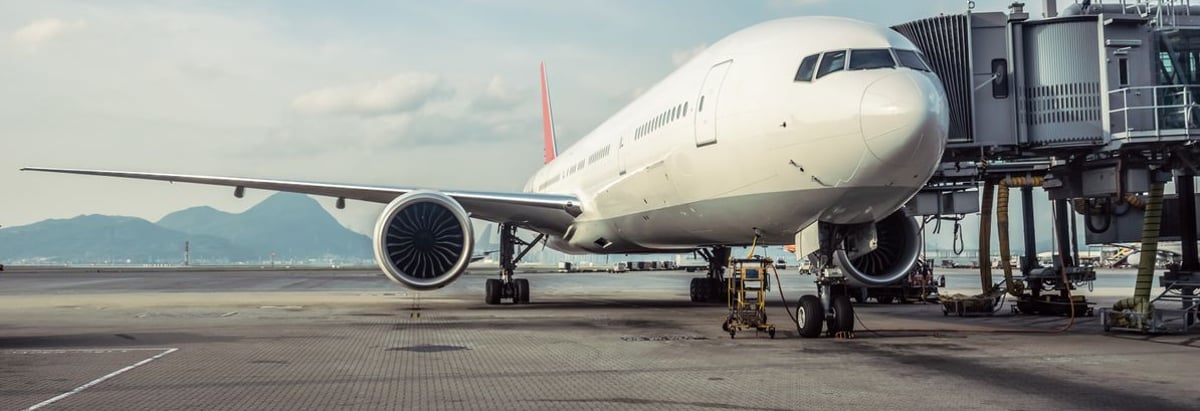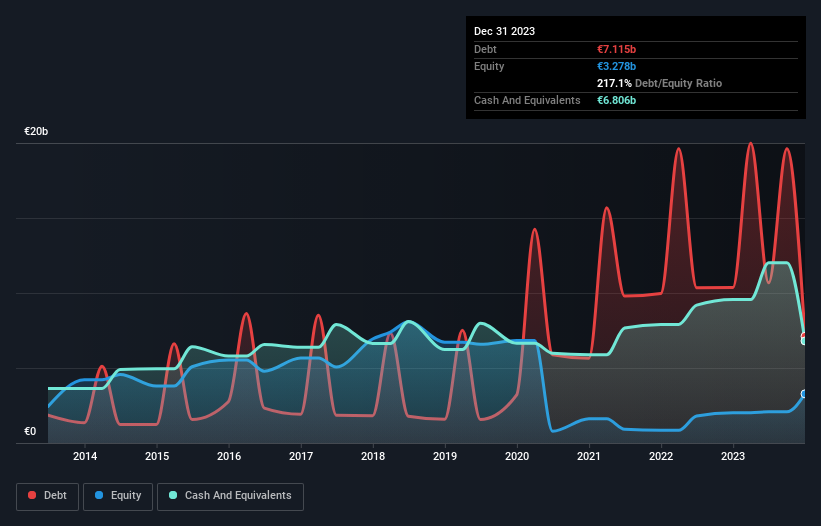- United Kingdom
- /
- Airlines
- /
- LSE:IAG
Does International Consolidated Airlines Group (LON:IAG) Have A Healthy Balance Sheet?

Some say volatility, rather than debt, is the best way to think about risk as an investor, but Warren Buffett famously said that 'Volatility is far from synonymous with risk.' It's only natural to consider a company's balance sheet when you examine how risky it is, since debt is often involved when a business collapses. We note that International Consolidated Airlines Group S.A. (LON:IAG) does have debt on its balance sheet. But the more important question is: how much risk is that debt creating?
When Is Debt A Problem?
Debt and other liabilities become risky for a business when it cannot easily fulfill those obligations, either with free cash flow or by raising capital at an attractive price. In the worst case scenario, a company can go bankrupt if it cannot pay its creditors. However, a more usual (but still expensive) situation is where a company must dilute shareholders at a cheap share price simply to get debt under control. Having said that, the most common situation is where a company manages its debt reasonably well - and to its own advantage. When we think about a company's use of debt, we first look at cash and debt together.
See our latest analysis for International Consolidated Airlines Group
What Is International Consolidated Airlines Group's Debt?
The image below, which you can click on for greater detail, shows that International Consolidated Airlines Group had debt of €7.12b at the end of December 2023, a reduction from €10.4b over a year. However, because it has a cash reserve of €6.81b, its net debt is less, at about €309.0m.

A Look At International Consolidated Airlines Group's Liabilities
The latest balance sheet data shows that International Consolidated Airlines Group had liabilities of €17.0b due within a year, and liabilities of €17.4b falling due after that. Offsetting these obligations, it had cash of €6.81b as well as receivables valued at €2.54b due within 12 months. So its liabilities total €25.1b more than the combination of its cash and short-term receivables.
The deficiency here weighs heavily on the €9.36b company itself, as if a child were struggling under the weight of an enormous back-pack full of books, his sports gear, and a trumpet. So we definitely think shareholders need to watch this one closely. After all, International Consolidated Airlines Group would likely require a major re-capitalisation if it had to pay its creditors today.
We measure a company's debt load relative to its earnings power by looking at its net debt divided by its earnings before interest, tax, depreciation, and amortization (EBITDA) and by calculating how easily its earnings before interest and tax (EBIT) cover its interest expense (interest cover). Thus we consider debt relative to earnings both with and without depreciation and amortization expenses.
International Consolidated Airlines Group's net debt to EBITDA ratio is very low, at 0.07, suggesting the debt is only trivial. But EBIT was only 5.1 times the interest expense last year, so the borrowing is clearly weighing on the business somewhat. Pleasingly, International Consolidated Airlines Group is growing its EBIT faster than former Australian PM Bob Hawke downs a yard glass, boasting a 161% gain in the last twelve months. When analysing debt levels, the balance sheet is the obvious place to start. But ultimately the future profitability of the business will decide if International Consolidated Airlines Group can strengthen its balance sheet over time. So if you want to see what the professionals think, you might find this free report on analyst profit forecasts to be interesting.
Finally, while the tax-man may adore accounting profits, lenders only accept cold hard cash. So it's worth checking how much of that EBIT is backed by free cash flow. Looking at the most recent two years, International Consolidated Airlines Group recorded free cash flow of 46% of its EBIT, which is weaker than we'd expect. That's not great, when it comes to paying down debt.
Our View
While International Consolidated Airlines Group's level of total liabilities has us nervous. To wit both its EBIT growth rate and net debt to EBITDA were encouraging signs. We think that International Consolidated Airlines Group's debt does make it a bit risky, after considering the aforementioned data points together. That's not necessarily a bad thing, since leverage can boost returns on equity, but it is something to be aware of. The balance sheet is clearly the area to focus on when you are analysing debt. However, not all investment risk resides within the balance sheet - far from it. These risks can be hard to spot. Every company has them, and we've spotted 2 warning signs for International Consolidated Airlines Group you should know about.
If, after all that, you're more interested in a fast growing company with a rock-solid balance sheet, then check out our list of net cash growth stocks without delay.
If you're looking to trade International Consolidated Airlines Group, open an account with the lowest-cost platform trusted by professionals, Interactive Brokers.
With clients in over 200 countries and territories, and access to 160 markets, IBKR lets you trade stocks, options, futures, forex, bonds and funds from a single integrated account.
Enjoy no hidden fees, no account minimums, and FX conversion rates as low as 0.03%, far better than what most brokers offer.
Sponsored ContentNew: AI Stock Screener & Alerts
Our new AI Stock Screener scans the market every day to uncover opportunities.
• Dividend Powerhouses (3%+ Yield)
• Undervalued Small Caps with Insider Buying
• High growth Tech and AI Companies
Or build your own from over 50 metrics.
Have feedback on this article? Concerned about the content? Get in touch with us directly. Alternatively, email editorial-team (at) simplywallst.com.
This article by Simply Wall St is general in nature. We provide commentary based on historical data and analyst forecasts only using an unbiased methodology and our articles are not intended to be financial advice. It does not constitute a recommendation to buy or sell any stock, and does not take account of your objectives, or your financial situation. We aim to bring you long-term focused analysis driven by fundamental data. Note that our analysis may not factor in the latest price-sensitive company announcements or qualitative material. Simply Wall St has no position in any stocks mentioned.
About LSE:IAG
International Consolidated Airlines Group
Engages in the provision of passenger and cargo transportation services in the North Atlantic, Latin America, the Caribbean, Europe, Africa, the Middle East, South Asia, the Asia Pacific, and internationally.
Undervalued with acceptable track record.
Similar Companies
Market Insights
Community Narratives



